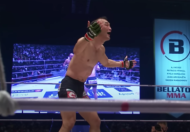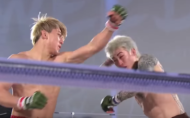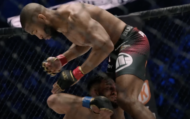IMMAF President Kerrith Brown Addresses 1988 Doping Ban
By Press Release
International Mixed Martial Arts Federation President, Kerrith Brown, has travelled a path of dramatic highs and lows, reaching the Olympian podium as a judoka to suffer a doping ban in 1988 that would change the course of his life.
In a new exclusive interview at immaf.org, the IMMAF President addresses the stigmatic mistake which continues to cast a shadow decades on.
“My lack of education about prohibited substances led me to make a mistake that cost me heavily and is without a doubt, one of the biggest regrets of my life. In Anti-doping as with the law, ignorance is not a defence. It certainly serves as a cautionary tale.”
Hoping that athletes can learn from his story, the President speaks in detail about the experience and is candid about the impact of his sudden fall from grace. He shares how the experience has shaped him both personally and as IMMAF’s premier.
Brown overcame the incident to be elected as Chairman of the British Judo Association in 2012, before being voted in as the President of IMMAF in 2015. Nonetheless the spectre of the past is still raised from time to time in quarters of the media.
Addressing this, Brown states:
“It is because of my own experience that I am so passionate about Anti-doping education for athletes and at IMMAF it is high on our agenda. Since I joined the organisation, we have hired Anti-doping expert and Commonwealth Games Medical Secretary, Michele Verroken, to implement anti-doping education for IMMAF athletes and coaches as well as our testing programme. It is through her that we recently partnered with the WADA ADeL platform and are actively encouraging national federations to do the online courses. We also recently bolstered our committees with a dedicated Anti-doping Disciplinary Commission and Ethics Commission to support the work of our Anti-Doping and Medical Committees and ensure fairness and impartiality. Our experiences as athletes have shaped mine and Densign’s [Densign White – IMMAF CEO] outlook in all areas of governing the sport, and putting athlete and participant welfare first lies at the heart of everything we do.”
Michele Verroken, who previously ran the UK’s Ethics and Anti-Doping Directorate at UK Sport was, at the time of Kerrith’s doping offence, Head of the newly formed Doping Control Unit at The Sports Council, working to enage sports bodies in a more responsible approach to anti-doping.
In partnering with IMMAF, she has asserted:
“ I am confident that IMMAF’s senior executives fully understand the importance of educating athletes about anti-doping, its rules, its obligations and above all the management of illness and injuries without risking a doping violation. Education first! No one should be without access to education. IMMAF has adopted a zero-tolerance policy to cheating by doping, and therefore, it is essential that athletes, coaches and medics know their responsibility to keep the sport safe and fair.
“Mistakes happen and what is important is how you respond. From Kerrith’s experience of how important anti-doping is, IMMAF has committed to achieve WADA (World Anti-doping Agency) Code signatory status and to ensure that lessons are learned.”
IMMAF is currently engaged in a legal case against the World Anti-doping Agency in the ordinary Swiss Courts, following the organisation’s rejection of IMMAF as a signatory despite it meeting all criteria. IMMAF claims that WADA’s decision was politically influenced.










